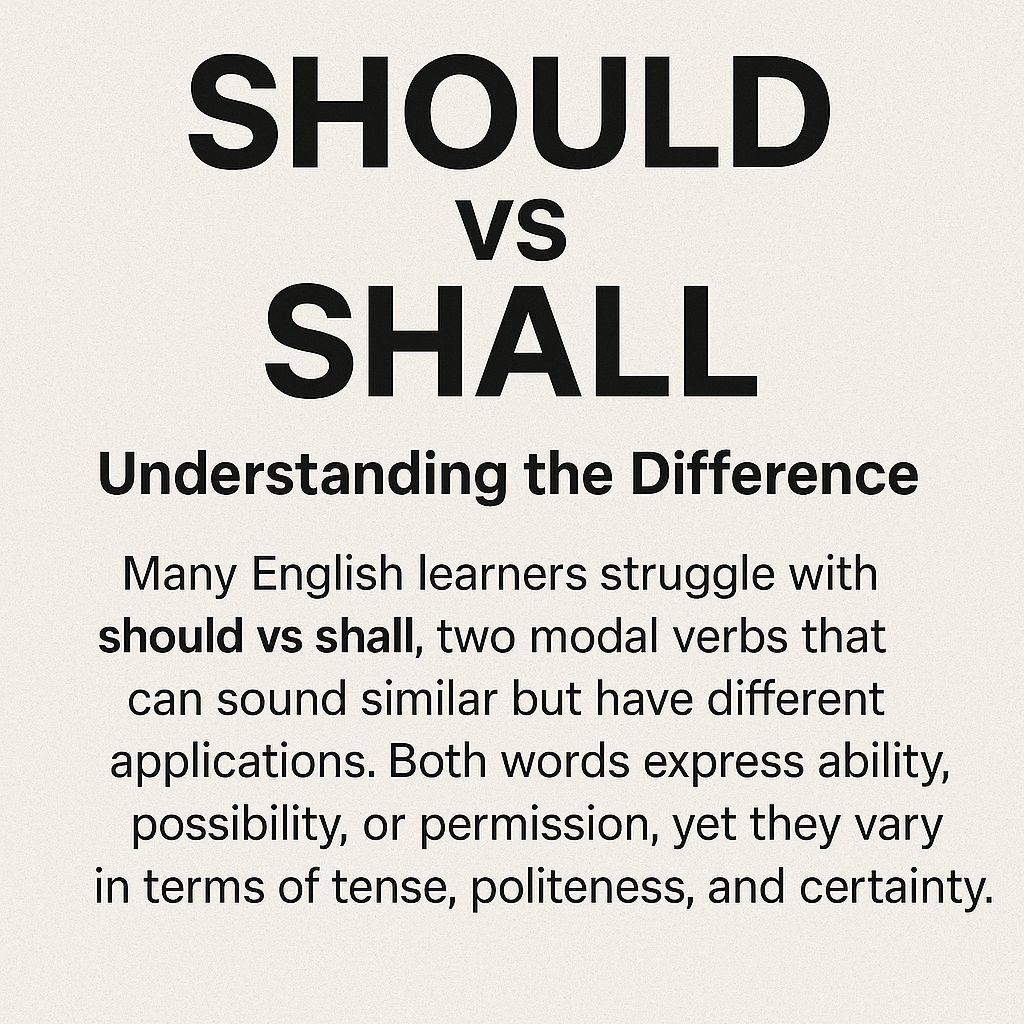Should vs Shall

Should vs Shall: Understanding the Difference
Introduction
Many English learners struggle with should vs shall, two modal verbs that can sound similar but are used quite differently. Both are used to talk about the future or make suggestions, yet they differ in tone, formality, and intent.
Should vs shall becomes especially confusing when learners try to express obligation, advice, or offers. “Shall” is more formal and traditional, often used in legal documents or polite invitations especially in British English. “Should” is much more common in everyday conversation and is used to give advice or express expectations.
If you’ve ever paused while writing or speaking, unsure whether to use should or shall, this guide will help you understand the difference, avoid common mistakes, and use both confidently.
Grammatical Explanation of Should vs Shall
Let’s break down the grammatical difference between should vs shall.
Shall is a modal verb that traditionally expresses future intention, particularly with first-person pronouns (“I” or “we”). For example:
- I shall return by 5 PM.
It’s also used for making formal offers or suggestions, like:
- Shall we begin the meeting?
Meanwhile, should is another modal verb used to express advice, duty, or expectation. It is often the go-to verb for giving recommendations:
- You should call your parents.
Unlike “shall,” should is widely used in both American and British English and across casual and formal contexts.
In the debate of should vs shall, remember: “shall” sounds more formal or old-fashioned, while “should” is practical and current.
Mastering should vs shall boosts your confidence in both writing and speaking. Use “shall” for formal contexts or polite suggestions, and “should” for advice and expectations. By understanding their meanings and tone, you’ll avoid common mistakes and communicate more clearly.
For more grammar tips and usage rules, explore this British Council resource on modal verbs.
And don’t forget to check out our other cluster pages to keep building your English skills!
Real-Life Examples
Here are examples to help you master should vs shall:
Correct Uses of “Shall”:
- Shall we have lunch together?
- I shall never forget your kindness.
Incorrect Uses of “Shall”:
- Shall you be home now? (Use “Will you…” instead)
- They shall coming later. (Wrong verb form)
Correct Uses of “Should”:
- You should take a break.
- He should have arrived by now.
Incorrect Uses of “Should”:
- Should you be go now? (Incorrect form should be “Should you go now?”)
- I should to leave early. (Remove “to”)
These examples demonstrate the importance of understanding should vs shall in both form and tone.
Find more grammatical tips in our blog:
Grammar/Usage Confusion
Common Mistakes
In the confusion between should vs shall, learners often make the mistake of using “shall” in casual speech, where it can sound overly formal or even awkward. For example, “You shall try this cake” sounds dramatic and outdated unless you’re quoting Shakespeare!
Another mistake is using “should” when stronger obligation is needed. “You should pay your taxes” is technically correct, but in legal or formal documents, “shall” is preferred: “Citizens shall pay taxes annually.”
Understanding when to use each helps you strike the right tone and formality.
Memory Tips of Should vs Shall
Here’s how to remember should vs shall:
- Shall = Formal Future or Polite Offer
Think of “shall” as sounding like a lawyer or a polite British host. - Should = Advice or Recommendation
Picture “should” as your helpful friend or teacher giving guidance. - Mnemonic Tip:
“Shall” is like a “Formal Call” — serious and official.
“Should” is like a “Gentle Push” — caring and suggestive.
Use this trick to confidently choose between should vs shall in any situation.
Conclusion
Mastering should vs shall boosts your confidence in both writing and speaking. Use “shall” for formal settings or polite suggestions, and “should” for everyday advice or expected behavior. By remembering their tones and contexts, you’ll sound both accurate and natural. Ready to tackle more confusing word pairs? Check out our other cluster pages to level up your grammar game.